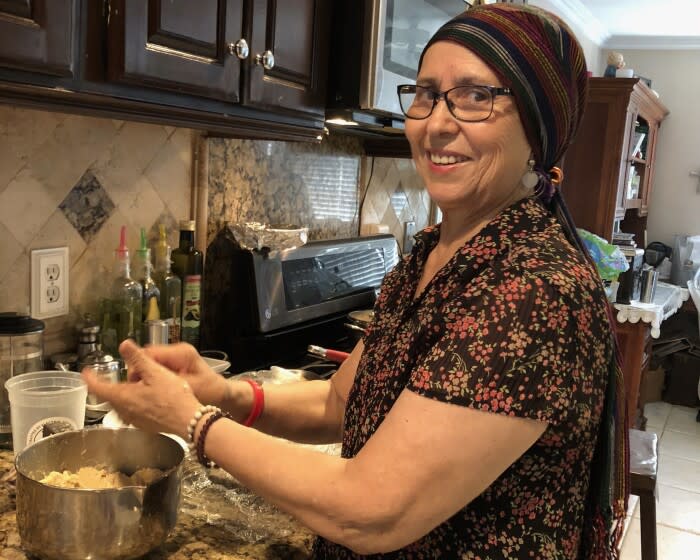Column: For Lent, I finally cooked my mother's capirotada recipe. It was OK — and that's OK

The bread was burned. Smoke swirled around the frying pan. Most of the cheese had turned moldy. And where was that last, crucial tomatillo husk?
I was trying to make capirotada, the bread pudding that Mexicans on both sides of the border prepare every Lent. I was already failing my late mother.
In 2019, I wrote a eulogy about her for The Times through the prism of my all-time favorite dessert, one that Mami would never offer me again. Maria de la Luz Arellano passed away at age 67 from ovarian cancer 10 days after my story was published.
I wrote the eulogy to praise her while she was alive but also as a warning to the living: learn the wisdom of your elders before it’s too late. Accompanying the piece was a recipe for my Mami’s capirotada, along with a promise to myself at the end to make it for my family the following year even though I had never attempted anything more complex in the kitchen than a quesadilla.
But when Lent came in 2020, we were all quarantining in our respective homes — and capirotada for one is no fun. I couldn’t bring myself to try last year because springtime just made me sad. Well-meaning aunts fed me other Lenten dishes to lift my spirits — chile rellenos, shrimp fritters, potato tacos, bean gorditas, and so much more — but I couldn’t bring myself to try their capirotada.
When Ash Wednesday came this year, I vowed anew to make my Mami’s capirotada … and the excuses came faster than a Shohei Ohtani fastball. I was too busy with work. I wouldn't be able to track down the right ingredients. No way would I match the heights of my Mami's fluffy, succulent capirotada.
Besides, whatever I might make would be disgusting and disappoint my family.
But when my dad narrowly averted a catastrophic auto accident, I realized yet again that we should cherish our parents while they’re alive.
So last week, I went for it.
I dusted off Mami’s recipe and went to Northgate González Market, the Latino supermarket giant my family has favored since its first location off Anaheim Boulevard in Anaheim opened in 1980 just minutes from our home. I bought raisins, almonds, lard, and bread in the form of bolillos — fluffy French rolls. Two pounds of piloncillo, four cloves, five tomatillo husks and six cinnamon sticks for the syrup that gives capirotada its distinct savory-sweet flavor. Northgate didn’t have the cheese from my ancestral state of Zacatecas lovingly nicknamed queso de pata — foot cheese — for its funky taste and scent, so I called up a friend who had the hookup.
I cut the cheese and and bolillos into strips, and let them air-dry for a couple of days, like Mami used to do. You’re supposed to make capirotada on Friday, the grand feast after a day of eating no meat. But a column got in the way, so I planned to do everything over the weekend. Oops — an appointment with my tax guy. Monday, I told myself — then meeting after meeting piled up.
Tuesday morning, I woke up earlier than usual. No more excuses. Better to mess up than not try at all. I'd either make my Mami proud — or give her and the saints a good laugh up in heaven.
I did mess up at first — to the point where my wife went into the kitchen to hear what all the sizzling and cursing was about. But I got into enough of a groove so that I could reminisce about my Mami throughout the process.
As I fried the bolillo slices and carefully stacked them inside a baking pan while sprinkling almonds and raisins, I thanked God for taking my mother before the COVID-19 pandemic. The parade of people who visited Mami in her last weeks gave her the strength to deal with unbearable pain. The hundreds who attended her wake and funeral were the support network my family needed.
Without them, I don’t know where we’d be mentally. Actually, I do. We’d be as disconsolate as the loved ones of the hundreds of thousands of Americans who died of COVID-19 and couldn't be properly mourned.
When I prepped a pot to make the capirotada syrup, I wondered what Mami would think about the pandemic and 2020. She would’ve been first in line to get the vaccine, would’ve scoffed at my Papi being a pandejo as long as he did, and browbeat anyone within a city block to jab up. She would’ve generally supported the country’s racial reckoning, although I’m sure my siblings and I would’ve talked with her about the colorism within our own family.
And though she was a rancho libertarian, Mami never liked Donald Trump, whom she always called Trompudo, in reference to his ever-pouting lips and big mouth. She would’ve thought that his attempts to overturn the 2020 presidential election were nothing less than treasonous.
Once the syrup was done, I poured it evenly inside the baking pan, then placed the capirotada in the oven to bake. I marveled at how Mami made capirotada or arroz de leche (rice pudding) nearly every Friday during Lent for decades without fail. While working full time as a tomato canner, then part time in her later years while taking care of the children of immigrants who were learning English. While raising four kids, then babysitting her first grandchild. While dealing with my dad.
Mami had far more reasons to skip a capirotada session than I, yet she never did. She even cooked for us while battling cancer — until she couldn't cook anymore.
The familiar cinnamon-heavy smell of the dessert filled the kitchen as I took it out to cool. It looked right — but would it be any good? I took a bite. It wasn’t half bad — I should've used more cheese, should've soaked the bolillos a bit better.
I gave a bite to my wife, who asked for another.

Tears welled in my eyes as I texted my siblings to see if maybe they wanted some. “Not really a fan, but I’ll try it,” my brother said. “I’ve never been a fan,” one sister said. Later that night, when my youngest sister who does like capirotada ate some, she said it was “amazing” and that “my mom would be proud of you” before complaining I added too many raisins and almonds.
Siblings, I’m telling ya.
As we playfully argued via text the rest of the day, I realized what Mami making capirotada was actually about. The dish wasn’t just her way of indulging us with the ultimate Lenten dessert. It was a method to transmit multiple lessons with each step and bite.
Good things take time. Take the time to do good things.
Tradition matters, but love matters more.
This story originally appeared in Los Angeles Times.

